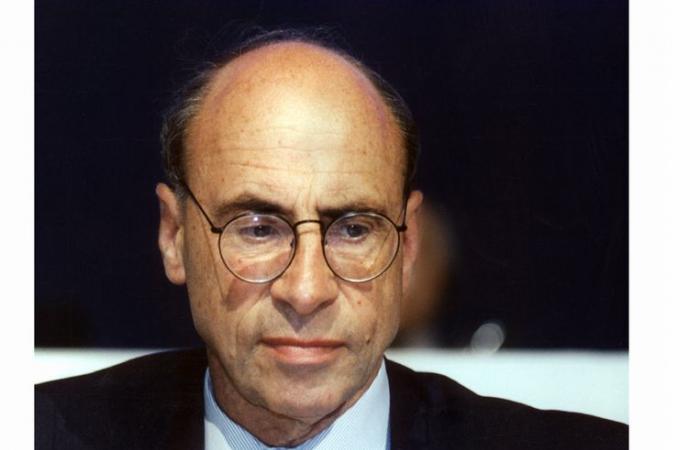As a business mentor, Floris Maljers taught the then crown prince Willem-Alexander how to read a balance sheet and profit and loss account. But this task pales in comparison to all the other positions that the former Unilever CEO had on his resume. Even his son Alexander is amazed at what he has done. ‘I couldn’t remember myself. From supervisory director at KLM, Philips and ABN Amro to mediator at Fokker and chairman of the committee for the Hedwigepolder.’
In 2019, Prime Minister Rutte Maljers named one of the bosses of multinationals who had taken their social responsibility: “Guys who earned decent salaries, but who we could be proud of because they ran their companies in fundamental reciprocity between what a company earns and what the people to deserve.’
Maljers, who, according to his family, passed away peacefully on Friday evening, was a real Zeeland. He grew up in Middelburg, where he went to grammar school. After graduating, he became an apprentice journalist at the PZC, the Provincial Zeeuwse Courant. Among other things, he had to make the reports of municipal council meetings. ‘So I spent evenings listening to discussions about a lamppost. Whether it had to be placed in front of the Burgemeester Koddestraat 7 or 14. At eighteen, that didn’t immediately feel like my life fulfillment,” he said in an interview with The Financial Times.
Talking about you in the executive bathroom
He decided to study economics in Amsterdam. There he also worked for an organization that arranged international internships for students. When an internship for a position at Unilever in Turkey came along, he decided to apply himself. On his return, Unilever asked him to manage the small, problematic branch in Colombia. He managed to make the loss-making subsidiary profitable.
‘You have to make sure that you do something special at the start of your career,’ said Maljers. ‘We always joked that you should be talked about in the executive toilet. It was of course a matter of luck that this opportunity came my way, but apparently I also did something right. My successor let the business slip and had to leave early.’
After another three-year period in Turkey, he returned to the Netherlands, where he became chairman of the board of the Rotterdam margarine company Van den Bergh en Jurgens. In 1974 he already joined the board of directors. And ten years later he became chairman of the board, succeeding Frans van den Hoven. Unilever had 300,000 employees worldwide at that time.
He was then the father of three children. Alexander Maljers: ‘It was a bizarre period. Just before he was appointed chairman of the board, his daughter, my sister, died of a brain tumour.’ Unilever was a mixed bag at the time. There were oil mills in Africa, beer breweries, animal feed companies, a shipping company for large-scale shipping and a factory for office furniture. The company had no understanding of all those activities. Maljers repelled them all. Four branches remained: food, home care, personal care and chemistry. Son Alexander: ‘My father can coin the word core activities.’
He bought the chemical company Naarden International to strengthen the chemical division. Particularly spectacular were his acquisitions of the American companies Chesebrough-Pond’s, Elizabeth Arden and Calvin Klein. In doing so, he made Unilever a leader in the cosmetics market. After three years, Unilever had the same turnover as Philips, but the company was three times as profitable. A detergent war with competitor Proctor & Gamble undermined those good numbers in the early 1990s. In his last year, 1993, Maljers bought 24 more companies for Unilever, mainly to gain a foothold in Eastern Europe and Asia.
Phillips
In that year he had already become a supervisory director at Philips, where ‘hurricane Gilbert’, as Jan Timmer was called, had to put things in order. After Wisse Dekker gave up, Timmer became chairman of the Supervisory Board. As a marketer, he felt that Philips paid too little attention to the consumer. That is why he brought in Cor Boonstra. He was tried and tested at coffee group Sara Lee fast-moving consumer goods, products with a short life and a rapid turnover. Maljers abruptly resigned when Boonstra fired one manager after another. But he wasn’t about to sit behind the geraniums just yet. New supervisory directorships followed at KLM, SHV, the Concertgebouw, BP and Vendex-KBB.
In 1996, Maljers was engaged by the cabinet as a mediator to save Fokker. Top man Jürgen Schrempp of Fokker owner Daimler-Benz wants 3 billion guilders in state aid. “I had never before encountered a negotiator who was so determined from the start not to negotiate,” Maljers said of Schrempp.
As a supervisory director at Vendex-KBB, he made another attempt to sell the department store group to Jaap Blokker of the chain of the same name, but he was unable to prevent Vendex-KBB from falling into the hands of the buy-out fund KKR in 2006. That stripped Vendex-KBB and sold it on, mainly to other buyout funds. At the age of 72 he was no longer allowed to hold supervisory directorships in the Netherlands. But he remained active for many years afterwards. His favorite book was Herzog from Saul Bellow. ‘If I’m out of my mind, it’s all right with me’, are the opening words. Three times he would reread the book.
Three X Floris Maljers
Margarine
In Turkey, Maljers had to introduce margarine for Unilever. He couldn’t, until he realized that all butter in Turkey (which was transported on open trucks in the heat) tasted rancid. The Turks liked that. He had a flavoring for rancidity developed, and Unilever’s margarine was still a success.
Willem Alexander
In the 1990s, Maljers toured the Dutch business community with Crown Prince Willem-Alexander. His spontaneity surprised some managers. “Your liquidity position is not very good,” the prince once remarked. Maljers later: ‘I said then, of course, that he should be careful with such remarks.’
Cream jar
Before he became CEO of Unilever, Maljers was already involved in the development of Roompot as a shareholder and advisor. When Henk van Koeveringe, the boss of Roompot, wanted to expand in the early eighties, Maljers advised him to find campsites in the area. “Choose a location where you can drive by.”
Tags: Floris Maljers influential allrounder Dutch business passed
-





